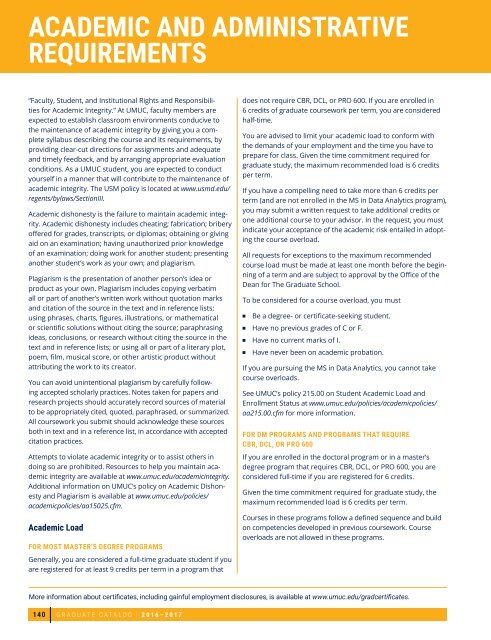2016–2017 2016–2017
2016-2017-graduate-catalog
2016-2017-graduate-catalog
You also want an ePaper? Increase the reach of your titles
YUMPU automatically turns print PDFs into web optimized ePapers that Google loves.
ACADEMIC AND ADMINISTRATIVE<br />
REQUIREMENTS<br />
“Faculty, Student, and Institutional Rights and Responsibilities<br />
for Academic Integrity.” At UMUC, faculty members are<br />
expected to establish classroom environments conducive to<br />
the maintenance of academic integrity by giving you a complete<br />
syllabus describing the course and its requirements, by<br />
providing clear-cut directions for assignments and adequate<br />
and timely feedback, and by arranging appropriate evaluation<br />
conditions. As a UMUC student, you are expected to conduct<br />
yourself in a manner that will contribute to the maintenance of<br />
academic integrity. The USM policy is located at www.usmd.edu/<br />
regents/bylaws/SectionIII.<br />
Academic dishonesty is the failure to maintain academic integrity.<br />
Academic dishonesty includes cheating; fabrication; bribery<br />
offered for grades, transcripts, or diplomas; obtaining or giving<br />
aid on an examination; having unauthorized prior knowledge<br />
of an examination; doing work for another student; presenting<br />
another student’s work as your own; and plagiarism.<br />
Plagiarism is the presentation of another person’s idea or<br />
product as your own. Plagiarism includes copying verbatim<br />
all or part of another’s written work without quotation marks<br />
and citation of the source in the text and in reference lists;<br />
using phrases, charts, figures, illustrations, or mathematical<br />
or scientific solutions without citing the source; paraphrasing<br />
ideas, conclusions, or research without citing the source in the<br />
text and in reference lists; or using all or part of a literary plot,<br />
poem, film, musical score, or other artistic product without<br />
attributing the work to its creator.<br />
You can avoid unintentional plagiarism by carefully following<br />
accepted scholarly practices. Notes taken for papers and<br />
research projects should accurately record sources of material<br />
to be appropriately cited, quoted, paraphrased, or summarized.<br />
All coursework you submit should acknowledge these sources<br />
both in text and in a reference list, in accordance with accepted<br />
citation practices.<br />
Attempts to violate academic integrity or to assist others in<br />
doing so are prohibited. Resources to help you maintain academic<br />
integrity are available at www.umuc.edu/academicintegrity.<br />
Additional information on UMUC’s policy on Academic Dishonesty<br />
and Plagiarism is available at www.umuc.edu/policies/<br />
academicpolicies/aa15025.cfm.<br />
Academic Load<br />
FOR MOST MASTER’S DEGREE PROGRAMS<br />
Generally, you are considered a full-time graduate student if you<br />
are registered for at least 9 credits per term in a program that<br />
does not require CBR, DCL, or PRO 600. If you are enrolled in<br />
6 credits of graduate coursework per term, you are considered<br />
half-time.<br />
You are advised to limit your academic load to conform with<br />
the demands of your employment and the time you have to<br />
prepare for class. Given the time commitment required for<br />
graduate study, the maximum recommended load is 6 credits<br />
per term.<br />
If you have a compelling need to take more than 6 credits per<br />
term (and are not enrolled in the MS in Data Analytics program),<br />
you may submit a written request to take additional credits or<br />
one additional course to your advisor. In the request, you must<br />
indicate your acceptance of the academic risk entailed in adopting<br />
the course overload.<br />
All requests for exceptions to the maximum recommended<br />
course load must be made at least one month before the beginning<br />
of a term and are subject to approval by the Office of the<br />
Dean for The Graduate School.<br />
To be considered for a course overload, you must<br />
<br />
Be a degree- or certificate-seeking student.<br />
<br />
Have no previous grades of C or F.<br />
<br />
Have no current marks of I.<br />
<br />
Have never been on academic probation.<br />
If you are pursuing the MS in Data Analytics, you cannot take<br />
course overloads.<br />
See UMUC’s policy 215.00 on Student Academic Load and<br />
Enrollment Status at www.umuc.edu/policies/academicpolicies/<br />
aa215.00.cfm for more information.<br />
FOR DM PROGRAMS AND PROGRAMS THAT REQUIRE<br />
CBR, DCL, OR PRO 600<br />
If you are enrolled in the doctoral program or in a master’s<br />
degree program that requires CBR, DCL, or PRO 600, you are<br />
considered full-time if you are registered for 6 credits.<br />
Given the time commitment required for graduate study, the<br />
maximum recommended load is 6 credits per term.<br />
Courses in these programs follow a defined sequence and build<br />
on competencies developed in previous coursework. Course<br />
overloads are not allowed in these programs.<br />
More information about certificates, including gainful employment disclosures, is available at <br />
140<br />
GRADUATE CATALOG | <strong>2016–2017</strong>


